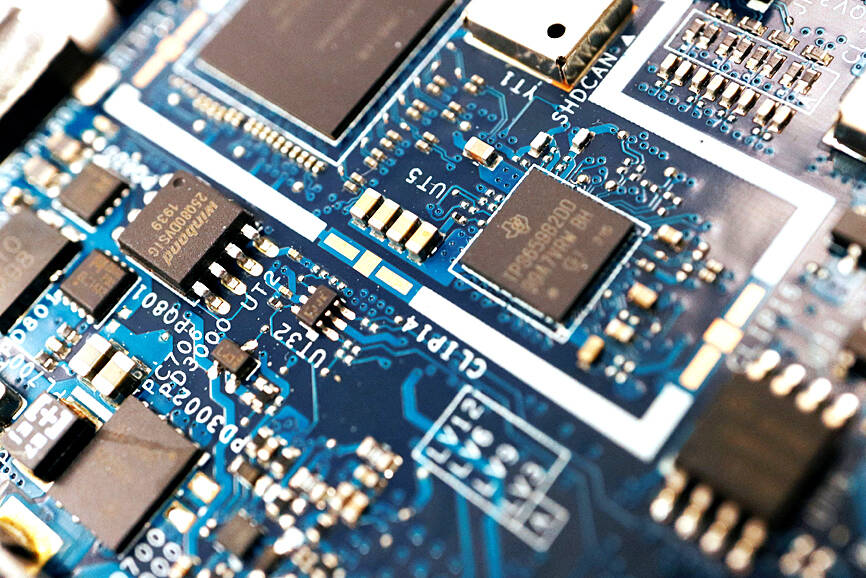Chip sales are set to cool more than previously expected as the global economy struggles under the weight of rapid interest rate increases and rising geopolitical risks, fueling fears of a recession.
World Semiconductor Trade Statistics (WSTS), a non-profit body that tracks shipments, lowered its market outlook to 13.9 percent growth this year from 16.3 percent. For next year, it sees chip sales rising just 4.6 percent, the weakest pace since 2019.
The market is still expected to surpass US$600 billion this year, WSTS forecast. Next year’s forecast growth would be the weakest since a 12 percent drop in sales at the height of the US-China trade dispute.

Photo: Reuters
Chip sales are an important indicator of global economic activity as households and firms increasingly rely on digital devices and online services to consume and expand.
US President Joe Biden this month signed the so-called CHIPS and Science Act aimed at strengthening the US semiconductor industry as China races to expand its own chipmaking capacity.
Japan is likely to see the strongest sales growth at 5 percent next year, followed by the Americas at 4.8 percent and the Asia-Pacific region at 4.7 percent, WSTS said. Europe, where Russia’s invasion of Ukraine is reverberating across the continent’s economy, is likely to post an expansion of just 3.2 percent.
Based in Morgan Hill, California, WSTS includes among its members Texas Instruments Inc, Samsung Electronics Co, Sony Semiconductor Solutions Corp and Yangzhou Yangjie Electronic Technology Co (揚州揚傑電子科技), according to its Web site.
Separately, US-based market information advisory firm IC Insights yesterday said it has adjusted its global semiconductor capital expenditure forecast this year to grow 21 percent year-on-year to US$185.5 billion, compared with the previous estimate of a 24 percent increase to US$190.4 billion it made at the beginning of the year.
The downward adjustment came as the semiconductor industry faces soaring inflation and a rapidly decelerating worldwide economy, causing many semiconductor manufacturers to re-evaluate their aggressive expansion plans, IC Insights said in a press release.
“Several (but not all) suppliers — particularly many leading DRAM and flash memory manufacturers — have already announced reductions in their capex [capital expenditure] budgets for this year,” it said. “Many more suppliers have noted that capital spending cuts are expected in 2023 as the industry digests three years of robust spending and evaluates capacity needs in the face of slowing economic growth.”
Despite the downward adjustment, the revised capital expenditure forecast for this year still represents a new record high and would mark the first three-year period of double-digit gains in the semiconductor industry since 1993 to 1995, IC Insights said.
Additional reporting by Chen Cheng-hui

Sweeping policy changes under US Secretary of Health and Human Services Robert F. Kennedy Jr are having a chilling effect on vaccine makers as anti-vaccine rhetoric has turned into concrete changes in inoculation schedules and recommendations, investors and executives said. The administration of US President Donald Trump has in the past year upended vaccine recommendations, with the country last month ending its longstanding guidance that all children receive inoculations against flu, hepatitis A and other diseases. The unprecedented changes have led to diminished vaccine usage, hurt the investment case for some biotechs, and created a drag that would likely dent revenues and

Macronix International Co (旺宏), the world’s biggest NOR flash memory supplier, yesterday said it would spend NT$22 billion (US$699.1 million) on capacity expansion this year to increase its production of mid-to-low-density memory chips as the world’s major memorychip suppliers are phasing out the market. The company said its planned capital expenditures are about 11 times higher than the NT$1.8 billion it spent on new facilities and equipment last year. A majority of this year’s outlay would be allocated to step up capacity of multi-level cell (MLC) NAND flash memory chips, which are used in embedded multimedia cards (eMMC), a managed

CULPRITS: Factors that affected the slip included falling global crude oil prices, wait-and-see consumer attitudes due to US tariffs and a different Lunar New Year holiday schedule Taiwan’s retail sales ended a nine-year growth streak last year, slipping 0.2 percent from a year earlier as uncertainty over US tariff policies affected demand for durable goods, data released on Friday by the Ministry of Economic Affairs showed. Last year’s retail sales totaled NT$4.84 trillion (US$153.27 billion), down about NT$9.5 billion, or 0.2 percent, from 2024. Despite the decline, the figure was still the second-highest annual sales total on record. Ministry statistics department deputy head Chen Yu-fang (陳玉芳) said sales of cars, motorcycles and related products, which accounted for 17.4 percent of total retail rales last year, fell NT$68.1 billion, or

In the wake of strong global demand for AI applications, Taiwan’s export-oriented economy accelerated with the composite index of economic indicators flashing the first “red” light in December for one year, indicating the economy is in booming mode, the National Development Council (NDC) said yesterday. Moreover, the index of leading indicators, which gauges the potential state of the economy over the next six months, also moved higher in December amid growing optimism over the outlook, the NDC said. In December, the index of economic indicators rose one point from a month earlier to 38, at the lower end of the “red” light.